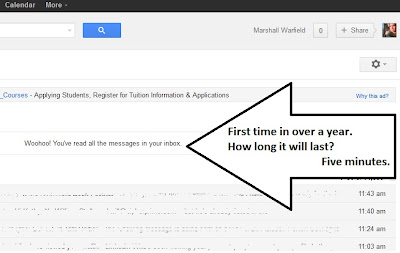In graduate school, I had the pleasure of taking a course on Classical Greek Rhetoric (taught by Dr. John Poulakos) with fellow graduate student, Steve Llano. I was in the English Department, Steve, Communications, and we hung out a few times: pizza, beer,
Doctor Who. We also talked about the intersections of our teaching. Steve taught rhetoric and debate. I taught composition (writing). We were cool guys. Steve, also a clever guy (and still cool), influenced my thinking about composition, and for that I will always be grateful. I still read his posts on Google+ from time to time. Once he described what he was doing with his debating students as "languaging." Like I said, clever.
This morning, reading Peter Elbow's 1999 essay from
Written Communication, "In Defense of Private Writing," I re-discovered a moment in the essay that I think is quite brilliant--a moment where again, I get to see the cool intersection of composition and debate. Elbow is tackling the tricky idea that writing can be a private act (even though we learn it socially), and he writes in his essay that some of the absolutist-sounding claims about composition should be seen less as positions of victory, and more as lenses through which we might see the world. He writes:
". . . if more people understood that lens statements and empirical evidence had only positive force and not negative force, they would be quicker to notice when they had slid into an unfruitful either/or argument. This understanding might even temper the hunger for winning as we know it. If by winning we mean demolishing the enemy view, this is impossible. If by winning we mean making everyone accept our position and feel the opposing one as old-fashioned, retrograde, naughty, shameful, or stupid, this is indeed possible. We see it all the time. But such winning is really losing because it robs the community of the fuller understanding that we need. I fear we may be (or perhaps recently have been) in such a condition among composition scholars: a condition where members had come to feel that the private lens, the sense in which language has a private dimension, was illegitimate or naughty.
There is only one way to really win—but winning is not a good word for this happy outcome: getting people to see the value of our lens, getting them habitually to try it out when they want to understand something—even people who do not quite like our lens or are not disposed toward looking through it. Surely, the best way to get reluctant people to look through our lens is to be willing to look through theirs.
Winning. Don't misunderstand my quoting of Elbow here. I don't see Elbow's position here as excuse to suffer fools. This moment of wisdom reminds me that any conclusions I want to make about a topic—if I want them to matter—are only arrived at through much careful observation and consideration (as in being considerate), and to mix a metaphor, listening. Something that debaters are well-trained in. How often do I remind myself of this? How often do I take the time to demonstrate this to my students? Yes, but do I do it rigorously enough?
Anyway, all of this is probably a bit too nostalgic for a post, but this morning's reading was a pleasant reminder of the good times with
Steve.








